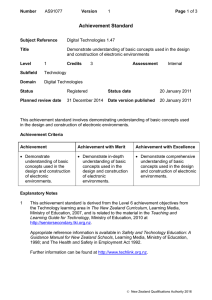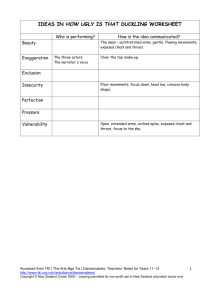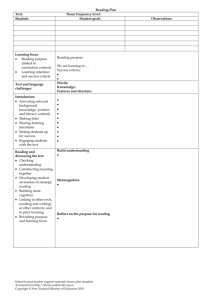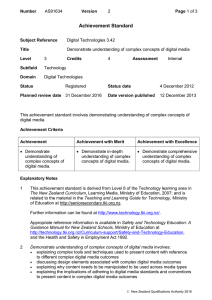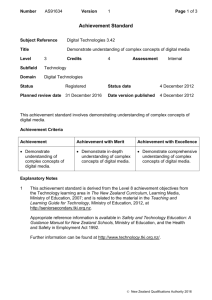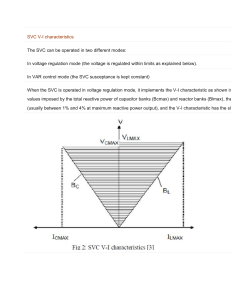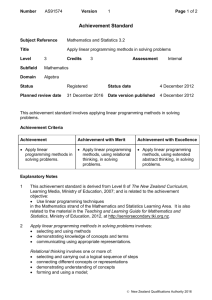68KB - NZQA
advertisement
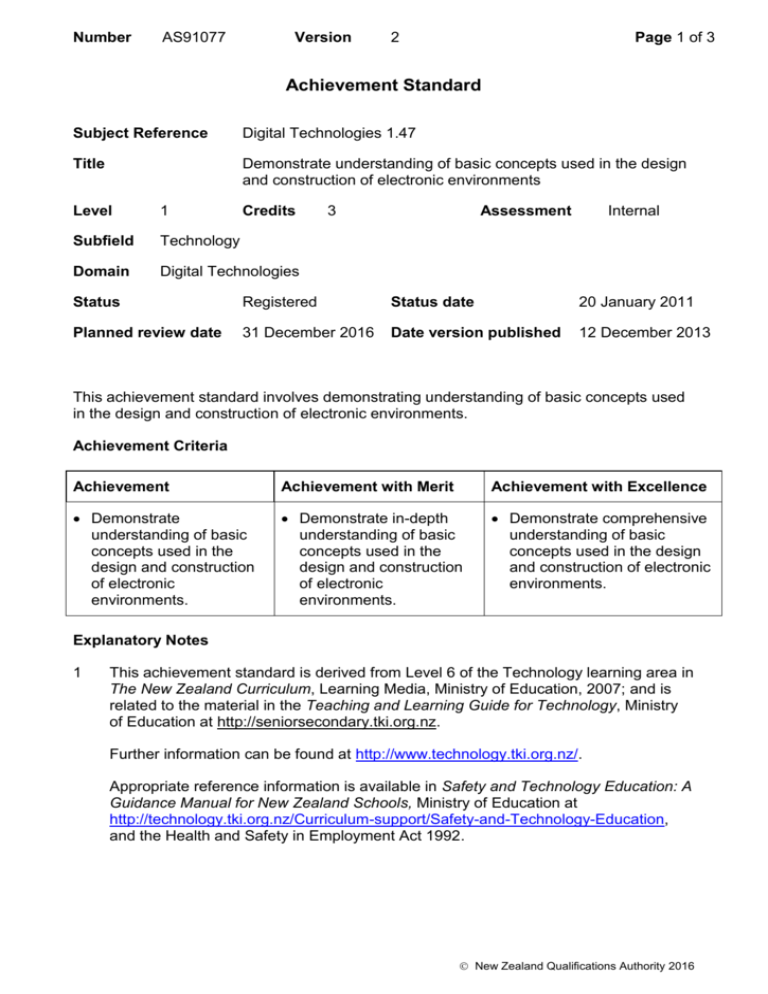
Number AS91077 Version 2 Page 1 of 3 Achievement Standard Subject Reference Digital Technologies 1.47 Title Demonstrate understanding of basic concepts used in the design and construction of electronic environments Level 1 Credits Subfield Technology Domain Digital Technologies 3 Assessment Internal Status Registered Status date 20 January 2011 Planned review date 31 December 2016 Date version published 12 December 2013 This achievement standard involves demonstrating understanding of basic concepts used in the design and construction of electronic environments. Achievement Criteria Achievement Achievement with Merit Achievement with Excellence Demonstrate understanding of basic concepts used in the design and construction of electronic environments. Demonstrate in-depth understanding of basic concepts used in the design and construction of electronic environments. Demonstrate comprehensive understanding of basic concepts used in the design and construction of electronic environments. Explanatory Notes 1 This achievement standard is derived from Level 6 of the Technology learning area in The New Zealand Curriculum, Learning Media, Ministry of Education, 2007; and is related to the material in the Teaching and Learning Guide for Technology, Ministry of Education at http://seniorsecondary.tki.org.nz. Further information can be found at http://www.technology.tki.org.nz/. Appropriate reference information is available in Safety and Technology Education: A Guidance Manual for New Zealand Schools, Ministry of Education at http://technology.tki.org.nz/Curriculum-support/Safety-and-Technology-Education, and the Health and Safety in Employment Act 1992. New Zealand Qualifications Authority 2016 Number 2 AS91077 Version 2 Page 2 of 3 Demonstrate understanding of basic concepts used in the design and construction of electronic environments involves: describing concepts of electronics in practical contexts describing the operational function of electronic components in a practical context (eg in a transistor switch sub-system). Demonstrate in-depth understanding of basic concepts used in the design and construction of electronic environments involves: explaining the behaviour of electronic circuits explaining the operational function of electronic components in a practical context. Demonstrate comprehensive understanding of basic concepts used in the design and construction of electronic environments involves: explaining the behaviour of electronic systems (eg the effect of voltage levels on the operation of a transistor switch sub-system) discussing the operational function of electronic components in a practical context (eg the effect of swapping the fixed resistor and the LDR in a voltage divider circuit). 3 Electronic environments refer to functional combinations of hardware and embedded software. 4 Basic concepts will include understanding of the function of electronic components, as well as at least five of the following: a circuit as a complete path voltage as an energy level current as rate of flow of charge conduction (limited to the macroscopic behaviour of conductors, insulators and semiconductors) circuit sub-systems symbolic conventions and schematics hardware (eg components and combinations of components) embedded systems as software subject to hardware constraints. Electronic components include: microcontroller (one example) cell switch (one or more of – SPST, SPDT, reed, relay) resistor (one or more of – fixed, variable, light-dependent (LDR), thermistor), light-emitting diode (LED) motor voltage divider and transistor switch sub-systems. 5 Conditions of Assessment related to this achievement standard can be found at http://ncea.tki.org.nz/Resources-for-aligned-standards/Technology/Level-1Technology. New Zealand Qualifications Authority 2016 Number AS91077 Version 2 Page 3 of 3 Quality Assurance 1 Providers and Industry Training Organisations must have been granted consent to assess by NZQA before they can register credits from assessment against achievement standards. 2 Organisations with consent to assess and Industry Training Organisations assessing against achievement standards must engage with the moderation system that applies to those achievement standards. Consent and Moderation Requirements (CMR) reference 0233 New Zealand Qualifications Authority 2016
